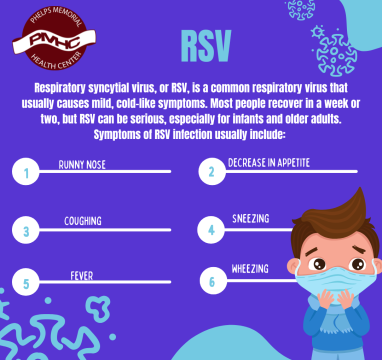Respiratory syncytial virus, or RSV, is a common respiratory virus that usually causes mild, cold-like symptoms. Most people recover in a week or two, but RSV can be serious, especially for infants and older adults. Symptoms of RSV infection usually include:
- Runny nose
- Decrease in appetite
- Coughing
- Sneezing
- Fever
- Wheezing
These symptoms usually appear in stages and not all at once. In very young infants with RSV, the only symptoms may be irritability, decreased activity, and breathing difficulties. Call your healthcare provider if you or your child is having difficulty breathing, not drinking enough fluids, or experiencing worsening symptoms.
When to call you doctor:
Call your medical provider If your child is…
- Having a hard time breathing
- Not eating, drinking, or peeing as usual
- Is sleepy, drowsy, or less active
- Is crying or restless and cannot be calmed down
- Has a fever above 102 degrees that will not respond to Tylenol or Ibuprofen
Visit the Emergency Room if your child:
- Has pale skin or a blue color around nail bed or lips
- Is breathing fast and shallow
- Is struggling for each breath
- The space between the ribs is sinking in with each breath
- Is making a grunting sound when breathing in and out
- Has a limp or floppy body
- Is sleepy all the time, even after a nap
These are generalized guidelines provided by Tiffany Weeder, APRN, please always follow any specialized instructions given by your primary doctor.



